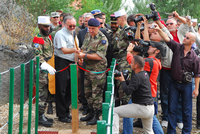PRISTINA, MITROVICA and GRACANICA, Kosovo -- A year after Kosovo declared independence, there has been no mass exodus of the Serb minority -- or worse -- as some critics feared. In fact, tension in the Serb enclaves has lessened and there is hope of further normalization, even in the restive North. "It is peaceful here," says Nebojsa Popovic, one of the few Serbs left on the Kosovo police force. Popovic commands a station in Gracanica, the centre of a Serb enclave 5km from Pristina, where Serb and Albanian traders and taxi drivers chat openly in the street. A soldier still stands guard at the town's Orthodox monastery, but this might change in the next 12 months, according to Lt. Gen. Giuseppe Gay, head of KFOR, the international military presence. The heartland of Serb resistance to Kosovo independence north of the Ibar river was not expected to be this calm this time last year. But to almost universal surprise, Serbian support for the Serb nationalist cause in Kosovo has waned. An election last May put an EU-friendly government in power in Belgrade, when many thought Kosovo's declaration might bring out ultranationalist votes.
A Year After Independence, Kosovo Enjoys Calm

